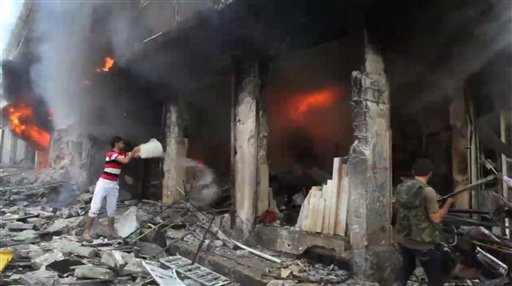By ELIZABETH A. KENNEDY
Associated Press
BEIRUT
Turkey accused Syria of “state terrorism” Wednesday after a sharp spike in the death toll from the Syrian civil war, and Iran came under new scrutiny with the U.S. alleging that Tehran is flying weapons to President Bashar Assad’s regime across Iraqi airspace.
With violence escalating in the nearly 18-month-old crisis, strains rippled across the region as Egypt’s president urged Assad to take a lesson from the Arab Spring uprisings that deposed other leaders and step down.
There appears to be no end in sight for the conflict, however. Neither side seems to be able to gain a significant advantage in the fighting that has killed 23,000 people, according to activists’ estimates.
Turkey has become one of the strongest critics of Assad and is host to Syrian opposition groups as well as about 80,000 of the more than 200,000 refugees who have fled to surrounding countries to escape the bloodshed.
The Syrian government’s crackdown has led to worldwide condemnation and sanctions, weakened the economy and left Assad an international pariah just as he was trying to open up his country and modernize the economy. His few remaining allies include Iran, Russia and China.
The New York Times reported that U.S. officials believe Iran resumed shipments of military equipment to Syria via Iraqi airspace in July after a three-month hiatus.
Ali al-Moussawi, media adviser to Iraqi Prime Minister Nouri al-Maliki, confirmed that Iranian planes are flying over Iraq to deliver goods to Syria. But he said Tehran has assured al-Maliki that the flights are carrying only food and other humanitarian aid for victims of the civil war.
Sen. Joe Lieberman, I-Conn., said Iraq’s failure to stop the flights could threaten the long-term relationship with the U.S. as well as aid Iraq could receive as part of a 2008 strategic pact between the two nations.
Tommy Vietor, the National Security Council spokesman at the White House, said Tehran “will stop at nothing to support a Syrian regime that is murdering its own people,” adding that Iraq, like all other nations, must block Iran from exporting arms.
The United States and other countries are also upset that China and Russia have repeatedly used their veto powers in the U.N. Security Council to block actions that could have led to sanctions against Assad’s regime. China says the civil war needs to be resolved through negotiations and not outside pressure.
The comment was a direct rebuke to Clinton, who has said the Chinese and Russian vetoes have put those nations “on the wrong side of history.”
She responded bluntly to Yang by saying the violence was boiling over into other countries like Jordan and Turkey and that the Security Council has to act.
At a meeting of Arab foreign ministers in Cairo, Egyptian President Mohammed Morsi warned his Syrian counterpart that “it’s too late to talk about reform. This is the time for change.”
His strong comments followed an address last month during a summit meeting of the nonaligned movement in Tehran, where the Egyptian leader gave a hearty call for world support of Syria’s rebels.
In new reports of fighting, the rebels said they shot down a government MiG jet and a helicopter.
The commander of the rebel Free Syrian Army, breakaway air force Col. Riad al-Asaad, told The Associated Press in a telephone interview from Turkey that the aircraft was downed in Abu al-Dhuhour, an area in the northwestern province of Idlib, five days ago.
A video posted online by the opposition showed the wreckage of a jet and the body of a pilot. The AP could not independently confirm the rebel claims or the video.
The narrator of the online video said the MiG was downed Tuesday. The discrepancy could not be immediately reconciled.
Al-Asaad said the rebels used anti-aircraft missiles captured from Syrian army bases. Rebels have claimed before that they have shot down government planes. The regime has acknowledged crashes in the past, but blamed them on mechanical failures.
Still, observers say the country is in for a bloody stalemate.
___
AP writers Suzan Fraser in Ankara, Turkey, Jamal Halaby in Amman, Jordan, Hamza Hendawi in Cairo, Lara Jakes and Qassun Abdul-Zahra in Baghdad and Pauline Jelinek in Washington contributed to this report.

COMMENTS
Please let us know if you're having issues with commenting.